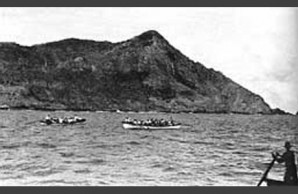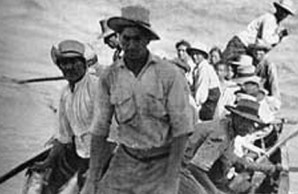“Robinson Crusoe’s Children”
The Strange Story of Nine English Mutineers Who Took Up Their Abode With Their Native Tahitian Wives, on a Desert Island in the South Seas.

MEETING THE SHIP
The Pitcairn Islanders are excellent boatmen. They are shown here following their usual custom, coming out to meet a newly arrived ship.
On two remote South Sea Islands, Pitcairn and Norfolk, dwell the descendants of the notorious mutineers of the “Bounty.” With only intermittent contact with the outside world, this two-fold colony has maintained its integrity for almost 140 years. The physical anthropologist could not ask for a more interesting group with which to work.
The history of the Norfolk and Pitcairn Islanders goes back to the Eighteenth Century when Bligh, in command of the “Bounty,” sailed from England on a botanical voyage to the South Seas. His mission was the result of petitions from the West Indian planters to the British Government that the widely heralded breadfruit of Polynesia be transplanted to the West Indies, where it might serve as an easy source of food for the plantation slaves. In October, 1788, ten months after leaving England, the “Bounty” reached Tahiti.
Even in these days of short and comparatively luxurious voyages, it is easy to imagine the great delight of the sailors on landing at one of the pleasantest of the South Sea Islands, where both Nature an the natives were kind. Bligh, in his journal published some years later, speaks of the rapidity with which each sailor soon had his particular “tyo” or friend, who acted as host during their stay at Tahiti.
After six months spent in collecting breadfruit and other indigenous plants, Bligh set sail from Tahiti in April, 1789. The partings were long and melancholy, and it was with evident reluctance that the crew set their sails to the breeze which was to carry them away from the scene of six happy months. Added to the discontent engendered by these farewells, was the familiar harshness of Bligh. One of the sufferers from Bligh’s behavior was Fletcher Christian, the mate, who on several occasions had felt the lash of his captain’s tongue. We can never know the true cause of the mutiny, but we may guess that the resentment of Christian found a ready response in the crew, discontented with their master and at leaving Tahiti.
Early on the morning of the 28th of April, the “Bounty” was in the neighborhood of the Tongan or Friendly Islands, when Captain Bligh was forcibly awakened by several armed men and discovered that he was a prisoner on his own ship. In his journal he recorded that he was entirely unaware of any mutinous feelings among the sailors, and from other evidence it seems that the mutiny was spontaneous. All Bligh’s efforts at persuading the men to give up their design were unavailing. At each attempt he was ordered to hold his tongue or he would be a dead man. Eighteen of the crew who were not in the plot were also taken prisoners, and the Captain and his faithful men were put adrift in a small boat weighted down almost to the gunwales. Only scanty provisions, consisting of 150 pounds of bread, 32 pounds of pork, 6 quarts of rum, 6 bottles of wine, and 28 gallons of water, were furnished.

A BOATLOAD OF PITCAIRN ISLANDERS
These men are sturdy members of the subsidiary colony now living on Pitcairn, where they number more than 175.
Whatever our estimate of Bligh’s personal character may be, we must grant him the great qualities which he exhibited in this difficult situation. In a crowded, under-provisioned boat, he determined on the bold plan of sailing for Batavia in the East Indies, where he could expect to find a haven and assistance. His voyage of 3000 miles, completed in forty-six days, over uncharted and dangerous waters, has remained to the present day a classic in navigation. There were other hardships which almost defeated Bligh. Hunger, raging thirst under the tropical sun, and attacks from hostile natives soon weakened the resistance of the men who looked to Bligh for guidance. He did not fail them, although he was forced to use drastic methods to save the men from themselves.
Christian, at the head of the twenty-five mutineers, now returned to Tahiti, where they accounted for Bligh’s absence with the story that he had met with Captain Cook, and that the “Bounty” had been sent back for more supplies. After several unsuccessful attempts at establishing a colony on a near-by island, Christian and the mutineers returned to Tahiti, where they separated into two parties. Sixteen of the men preferred to remain at Tahiti where they very soon set up menages. The other nine, anxious to find an inaccessible island where they might be safe from a punitive expedition from England, left Tahiti, taking with them about twelve native women and six native men.
When Captain Edwards of the “Pandora,” sent to capture the mutineers, reached Tahiti a couple of years later, nothing was known of the fate of Christian and his men.